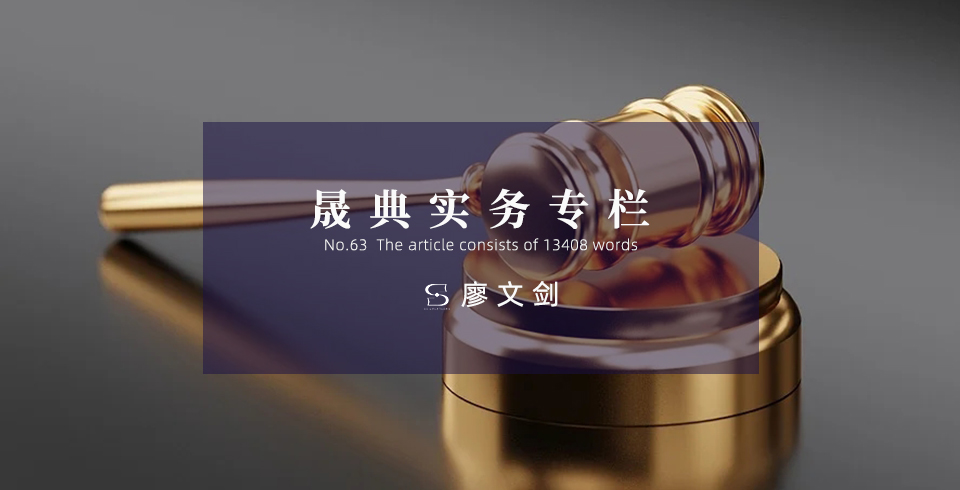Legal Qualitative Analysis of OTC Funding Behavior from Criminal Perspective
![]() Loading...
Loading...
![]() 2021.07.09
2021.07.09

Foreword:In recent years, with the development of the securities market, investors' enthusiasm for investment has continued to rise, and the degree of participation has gradually deepened. OTC capital allocation activities have a resurgence. Many speculators have taken risks in order to obtain high returns, and the risks in the securities market have increased sharply. In the practical world, there is no doubt that off-site funding is an illegal act, but whether the act constitutes a crime and what kind of crime it constitutes are controversial. This paper tries to analyze the legal characterization of the behavior of "off-site capital allocation" from the criminal perspective.
1. The concept and legal characterization of over-the-counter funding.
The so-called allocation of funds refers to the allocation of funds to investors in accordance with a certain proportion of the original funds on the basis of the funds advanced to investors. In the field of securities investment, there are two types of on-site and off-site capital allocation. Among them, on-site capital allocation refers to the behavior of investors borrowing money from securities companies or investing in stocks, which is commonly referred to as margin financing; and off-site capital allocation It refers to the behavior of investors borrowing money for investment through funding companies other than securities companies or online funding platforms such as P2P. Article 3 of China's Measures for the Administration of Margin Trading of Securities Companies clearly stipulates that securities companies must be approved by the China Securities Regulatory Commission (hereinafter referred to as the CSRC) to carry out margin trading business. Without the approval of the China Securities Regulatory Commission, no securities company may raise funds or securities lending to customers, nor may it provide any convenience and services for margin trading activities between customers and customers, or between customers and others. Article 120 of the Securities Law, as amended in 2019, also clearly stipulates that only securities companies that have been approved by the securities regulatory authority under the State Council and obtained a license to operate securities business can engage in securities financing and securities lending business. Except for securities companies, no unit or individual may engage in securities underwriting, securities sponsorship, securities brokerage and securities financing and securities lending. It can be seen that margin trading in China belongs to the franchise business, the main body engaged in margin trading business can only be securities companies. In other words, our law prohibits any unit or individual from engaging in over-the-counter funding activities.
In the case of over-the-counter capital allocation, the capital allocation company or platform outside the supervision lends its own funds or the funds raised at a lower cost to investors and earns the corresponding interest income. Although this kind of capital allocation method can provide investors with a higher proportion of capital allocation (leverage) and enlarge the rate of return on investment, because it avoids the restrictions of the regulatory authorities on the source of funds, investment targets, leverage ratio and many other aspects, it will bring greater investment risks to investors, aggravate the irrational fluctuation of the securities market and disturb the normal order of the securities market. For this reason, the CSRC identified over-the-counter capital allocation as illegal securities activities and maintained a severe crackdown on it. For example, the Guangdong Securities Regulatory Bureau continues to publish on its official website the list of institutions that do not have the qualifications to operate securities and futures business (as of June 2021, has been published in 36 batches), the purpose is to remind the majority of investors to improve risk prevention awareness, away from over-the-counter allocation and other illegal activities.
OTC funding is essentially private lending, in which a funding contract is signed between the funder and the investor to exchange funds for interest income. Regarding the validity of the over-the-counter capital allocation contract, the Minutes of the National Court Civil and Commercial Trial Work Conference issued by the Supreme People's Court in 2019 clearly pointed out that the over-the-counter capital allocation contract violated the franchise regulations and belonged to Article 52 of the Contract Law. The fifth item "violates the mandatory provisions of laws and administrative regulations", and the validity of the over-the-counter capital allocation contract is determined to be invalid. In 2019, the Supreme People's Court's Opinions on Providing Judicial Safeguards for the Establishment of the Science and Technology Board and Pilot Registration System Reform also found the validity of over-the-counter capital allocation contracts in the stock market to be invalid, thus showing that there is no doubt about the illegality of over-the-counter capital allocation in the field of civil law, but civil illegality is not the same as criminal illegality. Based on the complementary principle of criminal law, only acts with serious social harm need to be regulated by criminal law. Whether the off-site funding behavior needs to be evaluated by the use of criminal law, and what kind of crime may be involved in the off-site funding behavior included in the scope of criminal law evaluation still needs to be further clarified.
2. Determination of the nature of over-the-counter funding in criminal practice
The prosperity of the securities market can not be separated from the capital. Over-the-counter capital allocation can drive a large amount of funds into the market, bring up the securities market, and on the surface promote the prosperity of the market. However, the high leverage of over-the-counter capital allocation will inevitably bring about a high degree of instability of funds and extremely high risks in investment activities. Funds can easily trigger forced liquidation and exit, causing abnormal market fluctuations and even leading to market collapse. It can be seen that the social harm of over-the-counter capital allocation is not limited to investors, but also reflected in the destruction of the order of the securities market. The inclusion of off-site funding activities into the scope of criminal legal evaluation has become a consensus and has been reflected in judicial practice. Combined with our judicial practice, over-the-counter funding practices may involve the following charges.
(I) Crime of Illegal Business
Both the Regulations on the Administration of Futures Trading and the new Securities Law have made prohibitive provisions on over-the-counter capital allocation. Among them, the new Securities Law clearly stipulates that margin trading and securities lending business is a franchise behavior, and the main body of the business It is stipulated as a securities company that needs to be approved by the securities regulatory authority under the State Council and obtain a securities business license. The OTC company or platform obviously does not have the above qualifications. According to the provisions of paragraph (III) of Article 225 of the Criminal Law of China, anyone who, in violation of state regulations, illegally operates securities, futures or insurance business without the approval of the relevant competent departments of the state, or illegally engages in the business of fund payment and settlement, constitutes the crime of illegal business operation. Therefore, in judicial practice, over-the-counter funding is mostly convicted and punished for the crime of illegal business operations. For example, in the case of Bian Mou, Yu Mou and other illegal business crimes tried by Shanghai Pudong New Area People's Court ((2021) Hu 0115 Xing Chu No. 383), the defendant Bian Mou, as the actual controller of Sansong Asset Company, employed the defendant Yu Mou as the sales group leader and the defendant Fan Mou as the sales group salesman to develop customers for the illegal stock trading platform, in order to provide allocation of funds to attract customers to register for stock trading on the receiving view and Huichuang platforms, illegally operate stock business, and obtain rebates such as interest and handling fees. Another example is the case of Zhou Mou Lin's illegal business operation ((2021) Yue 2071 Xing Chu No. 141) tried by the First People's Court of Zhongshan City, Guangdong Province. The defendant Zhou Mou Lin did not obtain the business license of the relevant state authorities, in Shiqi District, Zhongshan City, through the "Golden Leopard" asset management software to Guo, Lin, Zhang and other 10 customers, according to the ratio of 1:5 or higher over-the-counter allocation of stock trading, and charge 1%-2% monthly interest.
In the over-the-counter capital allocation activities, because the capital allocation company or platform does not have the legal qualification to carry out margin trading business, its capital allocation activities must violate the national regulations, so does it mean that the over-the-counter capital allocation activities will indisputably constitute the crime of illegal operation? This paper thinks otherwise. As we all know, the crime of illegal business operation in China's criminal law is widely criticized because of its low threshold for conviction, and is even called "pocket crime". If its legal provisions are not strictly interpreted, it may further lead to the improper expansion of the scope of punishment and even hurt the innocent. Specific to over-the-counter fund allocation behavior, this paper holds that to determine whether the over-the-counter fund allocation behavior constitutes the crime of illegal operation, in addition to the need to examine whether the fund allocation behavior "violates the national regulations and has not been approved by the relevant departments of the state", it should also be strictly examined whether the fund allocation party has "operation" behavior, in other words, if the fund allocation party does not actually carry out "operation" securities business "(e: accepting securities trading entrustment, inquiring about securities trading information, carrying out securities trading services such as settlement and clearing of securities and capital transactions and compulsory closing of positions, etc.), only lend funds according to the allocation agreement, and the investor completes the transaction independently. The allocation party obtains interest and other income based on the agreement signed by both parties. Even if the allocation party lacks relevant qualifications, it should not be deemed to constitute the crime of illegal operation. The case of Zhou Mou's illegal business operation ((2019) Hubei 1224 Xingchu No. 38) heard by the People's Court of Tongshan County, Hubei Province confirmed the above view. In this case, Zhou Mou, a legal person of Wo Company, used the main account of futures trading opened from "Shenzhen Chuangtianhui New Asset Management Co., Ltd." (the main account is the personal account of normal futures trading) and the trading software of "Zhongzhou Financial Asset Management Platform" without obtaining the permission of futures and other futures companies to operate, use the main account to open the futures trading personal accounts of Yang and Wu from "Meile Ya Futures Co., Ltd.", and the futures trading personal accounts of Chen 2, Zhang, and Jia opened from "Yangtze River Futures Co., Ltd." Provide Tongshan customers Li, Song and others to conduct stock index futures transactions on the "Zhongzhou Financial Asset Management Platform, at the same time, Zhou provides allocation for the personal account used by the customer, carries out risk control for the customer's personal account, provides technical support, etc., and charges 1.2-1.5 monthly interest on the allocation, stock index futures trading fees, etc. for profit. After the trial, the court held that the defendant Zhou lent funds and provided a real futures trading account to the customer for futures trading, the customer completed the transaction independently, and Zhou collected interest and transaction fees according to the agreement for profit, and the allocation behavior was legal. Zhou's behavior does not constitute a crime.
(II) Fraud
As mentioned above, the lack of statutory qualifications for funding companies or platforms to engage in funding activities may constitute the crime of illegal business operations. The premise underlying this discussion is that the allocation behavior provided by the allocation company or platform and the subsequent securities trading behavior are true, and in practice, there is no shortage of allocation companies or platforms to attract investors by fictitious legal qualifications, and the use of false trading platforms to trick investors into allocation of funds for securities trading. Obviously, for such acts, should be found to constitute the crime of fraud.
The crime of fraud refers to the act of defrauding a large amount of public and private property by fabricating facts or concealing the truth for the purpose of illegal possession. The basic composition of the crime is that the perpetrator commits deception, which causes the victim to have a wrong understanding and disposes of property based on it, resulting in the perpetrator obtaining property and the victim suffering property losses. On the occasion that the distribution company uses the false trading platform to lure investors into securities trading, because the distribution company has fabricated the facts, the investors mistakenly think that they are trading on the real trading platform, and based on the misunderstanding, they enter the fund allocation transaction on the above-mentioned false platform, resulting in property loss, and their behavior is in line with the criminal composition of the crime of fraud. For example, in the case of Su Mouhua and Zhu Mouqiang Fraud ((2020) Yu 13 Punishment Final No. 803), the defendant's Chencan Company, without any financial license, took the cover of operating offline stock allocation and speculation, and made up that the company was a legal institution approved by the CSRC. It could defraud the victim's trust by means of distributing strong stocks and attract the victim to invest in the false stock allocation and speculation platform provided by the company. The trial court held that in this case, the funds used by the victim to speculate in stocks did not enter the formal stock trading market, and the defendant used a false stock trading platform to trick the victim into speculating in stocks, which is essentially a crime of fraud.
It can be seen that whether the trading platform is false is the key to determining whether the allocation behavior constitutes fraud. But whether as long as the trading platform is false, it will be determined to constitute the crime of fraud, there is still room for further discussion. This paper holds that under this circumstance, the data source of the false trading platform (virtual disk) and whether the fund-raising party can change the platform data, manipulate and control the trading market should be further verified, so as to find out whether there is a causal relationship in criminal law between the victim's loss and the actor's deception (providing a false trading platform). If the transaction data in the virtual disk used by the fund-raising party is completely false, the fund-raising party can change the data in the background, control the trend of the platform market, determine the profit and loss of investors, the fund-raising party constitutes the crime of fraud should not be disputed. However, if the data in the virtual disk used by the fund allocation party is not directly connected with the real securities market, but applies the real-time transaction data of the securities market, the fund allocation party cannot change the data through the background, nor can it manipulate and control the platform market. At this time, although the trading platform is still a false platform, the investment profit and loss of investors still depends on the real market situation, rather than the artificial manipulation of the fund allocation party, there is no causal relationship between the investor's loss and the false trading platform provided by the fund-raising party, so it is not appropriate to determine that the fund-raising party constitutes the crime of fraud. It should be pointed out that although the fund-raising party does not constitute the crime of fraud at this time, its illegal operation of securities business without approval can still constitute the crime of illegal operation; in addition, whether the fund-raising party and the investor are gambling at this time, and whether the fund-raising party's behavior is suspected of the crime of opening a casino, there is also room for further discussion.
(III) Other charges
The above two charges are more commonly involved in the practice of out-of-field funding activities, and may also violate other charges in combination with the specific links of funding activities.
1. The crime of fund-raising fraud or the crime of illegally absorbing public deposits.
From the funding source of the company or platform. If the fund allocation company or platform is engaged in the fund allocation business, it needs to have strong financial strength. If the fund allocation is not the fund allocation party's own fund, but the fund allocation party cleverly set up a name to raise funds from unspecified people in the society, the fund allocation party's fund-raising behavior may be suspected of illegal fund-raising, which constitutes the crime of fund-raising fraud or the crime of illegally absorbing public deposits. For example, in the (2018) Chen Moucong fund-raising fraud case tried by the Intermediate People's Court of Taizhou City, Zhejiang Province, the defendant Chen Moucong, knowing that he was unable to return the principal and interest of others when the company was operating continuously at a loss, still fabricated the illusion that the company was in good condition, fabricated false reasons such as loan repayment, investment, P2P, etc., and used high interest as bait, in the name of P2P platforms such as "Yuanbao Street" and "Taicheng Loan", they illegally raised funds from unspecified objects in the society, and used the funds raised to pay the principal and interest of the previous loans and stock allocation, so that the funds raised could not be returned. The court finally found that it used fraudulent methods to raise funds illegally for the purpose of illegal possession, which constituted the crime of fund-raising fraud.
2. Crime of infringing upon citizens' personal information
In the distribution company or platform development customer (investor) link. In practice, funding companies or platforms often solicit customers by making phone calls and WeChat contacts. However, these telephone numbers, WeChat accounts and other information are often obtained illegally by distribution companies or platforms through purchase and other means. According to the provisions of Article 1 of the Interpretation of the Supreme People's Court and the Supreme People's Procuratorate on Several Issues Concerning the Application of Law in Handling Criminal Cases of Infringing Citizens' Personal Information [2017] No. 10, "Citizen's Personal Information" refers to various information recorded electronically or in other ways that can identify the identity of a specific natural person or reflect the activities of a specific natural person alone or in combination with other information, including name, ID number, communication contact information, address, account password, property status, whereabouts, etc. Citizens' mobile phone numbers and WeChat accounts clearly belong to "citizens' personal information". Therefore, the illegal acquisition of citizens' personal information by a funding company or platform through purchases may be suspected of infringing on citizens' personal information.
3. Contract fraud
From the process of signing and fulfilling the distribution contract. Some funding companies in the name of carrying out funding, in fact, through malicious liquidation and other ways, the illegal possession of investors' funds, may constitute the crime of contract fraud. For example, in the contract fraud case of Zhao Mou and Hou Mou Hai ((2019) Zhejiang 01 Xing Chu No. 117) tried by Hangzhou Intermediate People's Court of Zhejiang Province, the defendant Zhao Mou incurred huge debt losses due to the stock allocation business, and still cooperated with the defendant Hou Mou Hai reached an agreement with the financing victim to forcibly close the position without authorization under the condition that the victim paid according to the contract and the account was profitable, use the victim's deposit and proceeds to repay personal debts, squander and transfer. The court found that Zhao and Hou constituted the crime of contract fraud.
3. Epilogue
In the securities market, over-the-counter allocation is like a parasite, curling up in a corner of the securities market and constantly grabbing profits. Under the joint suppression of national laws and policies, in order to obtain living space, over-the-counter funding institutions are constantly changing their methods and cleverly establishing names, using new technical means or personal accounts to "investment consultants", "virtual trading", "I contribute, you" Propaganda and other methods to induce investors to participate in illegal securities activities, seriously damage the legitimate rights and interests of investors, and disrupt the normal order of the securities market. To be sure, in order to maintain the order of the capital market and effectively play the hub function of the capital market, the state will crack down on illegal securities activities, including over-the-counter capital allocation. The revision of the Securities Law has provided a strong starting point for the state to crack down on over-the-counter capital allocation from the criminal legal level, and the recently issued "opinions on strictly cracking down on illegal securities activities in accordance with the law" has put forward more clear requirements for strictly cracking down on illegal securities activities, including resolutely cracking down on large-scale and systematic over-the-counter capital allocation activities in accordance with the law.
At the level of criminal law, off-site funding is gradually being included in the evaluation of criminal law, and the discussion of its legal characterization is constantly being refined and deepened. The use of criminal means to combat OTC funding can effectively curb the spread of OTC funding activities. However, under the idea of strict crackdown, we should still adhere to the principle of modesty of criminal law, and only use criminal law to regulate off-site capital allocation acts that are seriously harmful to society and meet the specific elements of crime, so as to prevent the improper expansion of the crackdown. In addition, as there is still controversy in the criminal law circle on the characterization of off-site capital allocation behavior, how to realize the unity of the identification standard and the judgment scale still needs to be further explored in judicial practice.
Author Introduction



